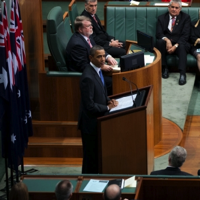President Barack Obama’s recent trip to Australia highlighted, in a very deliberate way, a decision to shift U.S. attention and resources away from the Middle East and toward East Asia. Obama’s remarks to the Australian Parliament, combined with his announcement of a new basing agreement at Darwin, on Australia’s northern coast, framed several days of discussions on the role that the United States would play in Asian power politics. Sam Roggeveen of the Lowy Institute of International Politics, an Australian foreign policy think tank, suggested that Obama’s speech in Canberra was as important and consequential as the Cairo speech of 2009. Of course, the speech itself is only worth as much as the underlying changes in policy that follow. In concrete terms, what does it mean when Obama that, “as a Pacific nation, the United States will play a larger and long-term role in shaping this region and its future”? And how will we know that the United States is following through on this commitment?
One way that the speech and its attendant shift in U.S. military posture will have an impact is in how regional actors adjust their expectations of U.S. behavior. The important players in this regard include not just the U.S., China and Australia, but also India, Vietnam, South Korea, Japan, Indonesia and Malaysia. This readjustment could reverberate through the defense and foreign policies of these nations, potentially in unpredictable ways. U.S. allies can be expected to act with more confidence, while China might respond to what it perceives as a threat. For example, shortly before the America’s entry into World War II, President Franklin D. Roosevelt deployed the battleships of the Pacific Fleet to Hawaii from San Diego, even though the facilities at Pearl Harbor were not yet ready to maintain the fleet. This had the effect of sending a message to Japan, but also served to make the Pacific Fleet less ready for combat and more vulnerable to an attack, one that did ultimately come. Of course, no one expects war to result from the current U.S. “pivot” to Asia, but China might feel the need to respond in some aggressive fashion.
Indeed, the announcement of the base at Darwin has a military as well as a strategic logic. China’s increasing capabilities, particularly in the field of ballistic missiles and potentially in the field of stealth strike aircraft, have placed current U.S. bases in Japan and South Korea in the radius of attack. And so while the shift of resources to Australia could be seen in this context as a retreat, it also represents a more realistic distribution of capabilities, given current Chinese military strengths. Potentially, China could misread this step as a U.S. decision to give the PRC’s ambitions a bit of space. However, it appears that the Chinese have thus far read the move as aggressive rather than accommodating.

